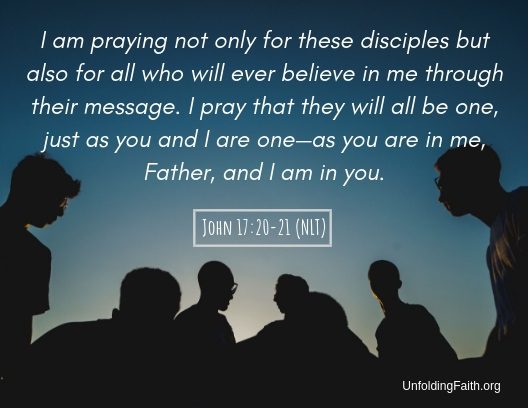
Do You Have a Moment to Talk about Jesus Christ? How to Talk about Your Faith and Not Be Unbearable.
You’ve probably already been told by your pastor or a person at church that you should fulfill the “great commission” of spreading the Good News about Jesus (also known as “evangelism”) to your friends, family, coworkers, neighbors, librarian, and cousin’s best friend’s mother-in-law.
Okay, so maybe not that extreme, but you know you are supposed to spread the gospel, and you are not sure how to do so without offending or annoying anyone.

Christians are called to be reflections of Christ. We should strive to mimic Jesus in everything we do, everything we say, and everywhere we go.
Of course, this is not so easy! Especially as a new Christ follower, how do you know enough about Jesus Christ to accurately reflect him now?
The answer is simple—love, serve, and respect. That’s precisely what Jesus did in his time on earth, and that is what we’re called to do.

But wait; we are human beings. We’re essentially flawed and may have so far lived rather selfish lives. Now that you’re a Christian, you can begin to understand what a life in Christ means. As you progress in your journey, God will show you the areas where you need to make changes. He will prompt your heart, and you will see how your actions and words will change as the Holy Spirit works in you.
It’s not going to be an instant change, though—it will take time. But your friends and family will notice a difference, and it’s that difference that will demonstrate God’s love for them, too. That’s when they will see your loving, serving heart and your respect for them and others. Embrace this change—you’ll see how good it is to be the light in a tough world.

It’s through acts of service, helping others without an agenda, that you reflect God’s love on others. Think about a time that you did something for someone without expecting anything in return. If we’re honest, there are probably not many instances where that happens—unless we have a deep love for someone. Well, now you’re called to perform these selfless acts for all people. This can take on many forms. See this list for simple ideas on how to love on people every day >>
You can also share words of encouragement that reflect God’s love for others. This could be a simple compliment, an encouraging word, a thoughtful Bible verse, or just asking how the other person is doing. Listening is a key skill in this aspect; allow your friends and family to open up and be real with you, just by being a good listener. The better you get to know them, the better you can understand how to see their needs through the lens of Christ.

This also applies to people you don’t currently know. As mentioned earlier, you can shine the light of Christ wherever you go, and to whomever you interact with. This includes the guy at the coffee shop who serves you each morning, or the cab driver in front of you. Maybe it’s your child’s teacher or even the passenger next to you on your flight. We all have daily opportunities to love on and interact with people. You can use each one to reflect God’s love on every person you meet. This doesn’t mean you have to bring up the subject of Jesus every time; it could simply be the way you thank them instead of being a grumpy, uncaring customer who takes no time to greet them or give them a smile. Simple acts can mean a lot.

Of course, should you have an opportunity to speak about the gospel message, do so by all means! How do you do this? Let God guide you. Sometimes it’s a conversation that gets deeper than you expected with a stranger in a café; perhaps you get the chance to tell them you’re a Christian, or how Jesus has changed you and given you hope, and maybe that’s exactly what they need to hear today.
Typically, though, we have more chances to speak to the needs of those we have relationships with. Your nonbelieving friends and family may be wary of your new life and resistant to learning about Jesus Christ. You don’t have to try to talk to them about faith each time you see them. Listen to their concerns and struggles, and be a good friend to them. Show them the love of Christ through acts of service. Give them encouraging words when they need it. Eventually you will get the chance to explain how Jesus has changed your heart and how they can experience his love too.

In Doug Nuenke’s short-read book Latte Love: Helping Everyday People Bring the Gospel to Their Friends, he talks about “the power of affirmation” in bringing to Christ the people closest to us, and how we cannot separate our spiritual lives from our everyday lives. He writes,
I believe that we get off on the wrong foot when we divide our lives, interactions, and words into spiritual and not spiritual. The spiritual dimension of life is not separate from the rest of life. Spiritual reality—God’s presence, work, and His kingdom influence—is a cool, refreshing breeze that flows through all of life. Our belief in an omnipotent, omnipresent creator God leads us to the conclusion that there is a spiritual dimension to every aspect of our lives—our emotions, our actions, our words, and every activity we participate in. Having this outlook can help us realize that we can perceive and discover the spiritual in all creation and in every activity of life. There are spiritual nuances and spiritual truths that can be uncovered in the movies we watch, songs we listen to, and in the desires and dreams of both believers and nonbelievers alike.
What Nuenke means here is that we should not think of our spiritual lives as being entirely separate when we’re interacting with our nonbelieving friends and family. We’re Christians, all the time. Christ is at the center of everything we do, every day. And when we’re talking with our nonbelieving loved ones, He should be at the center of that, too.

Spreading the Good News is a team sport. Just as we reflect Christ’s image when we come together in community at our churches, we share the responsibility of spreading the love around. Each of us possesses unique gifts to use for the Kingdom, given to us by God. Everybody has different skills, and we help each other spread the news by pooling those skills. Jesus prayed for the community of believers and endorsed their love for one another as the best evangelism technique.

Use your community to help you with spreading the Good News, and volunteer in your church’s efforts in local and global outreach. The more people God has working on sharing the gospel, the more powerful it will be!
In his very helpful book Good News for a Change, Matt Mikalatos offers practical insight into how to talk to anyone about Jesus. He makes an important distinction between just talking and relationship building:
“The gospel” is theological constructs, but “good news” is personal. . . . What is most meaningful about the good news of Jesus for someone else might be different than what’s most compelling about the good news to you or me.
Mikalatos makes the argument that long-term relationships allow us far better access to what is important to a person, and therefore we’re better able to speak into that and offer them the eternal hope of salvation through the work of Jesus Christ. We can more effectively apply God’s promises to the things that matter most to the people we know.

As you start spiritual conversations with people, here are five things to remember, adapted from Matt’s book:
- Ask questions.
Let people share where they are in life. You don’t have to guess what their needs are—just ask them. It’s important when you’re asking questions, too, to make sure you’re truly listening. Don’t spend time thinking about what you want to say in response, or how to connect this to the good news, or what your next question will be. Be present and listen to their answers. Most people will reciprocate with questions of their own in time. It’s okay sometimes to wait to be asked a question rather than pushing your statements into the conversation.

- Build a relationship, not an agenda.
Have you ever met one of those people who sees you as either a project or a stepping stone? You know, the guy who wants to connect because you’re friends with a famous person? Or the lady who keeps inviting you over and just happens to mention how great her ionized water filter is, and did she mention that she sells them? Most of us can sense ulterior motives, which means that we need to not have ulterior motives when it comes to sharing the good news. You don’t make friends so you can share the good news; you make friends because they are people you care about and want to get to know . . . and you share the good news because they are your friends.
- Take your time—the good news often starts out small.
The good news is a seed. You don’t have to plant a forty-foot maple in the first conversation. Maybe you’re only going to get to “God loves you.” Or maybe you don’t even get that far! Maybe you’ll just get to “I believe there is a God.” If you’re going to be in relationship with this person, you’re going to have opportunities to move the conversation forward in the weeks, months, and years to come.
- Put people before presentation.
Sometimes we get so focused on telling people about Jesus right now that we end up trampling on what they’re trying to say to us. Sometimes it’s even a deep hurt that might lead them to understand the good news about a loving God who brings life. Remember this: Evangelism is always about people. We have to learn to see people before we can share with them.

- Ask permission to go deeper.
Sometimes we are so eager to push our spiritual conversations to the next place that we can scarcely contain ourselves. Our friend says, “Hey, I got some good news today!” and we burst out, “Is it about how God loves the world and sent his only Son?” That’s not bad—it’s great to be excited. But asking for permission to talk about deeper things shows a lot of respect for your communication partner. So, for instance, you could say something like “This is such an important part of your life. I’d like to talk about spiritual things with you. Would that be okay?” Then they get to choose whether they want to walk into that conversation, and they know that if they want out of the conversation, you’re going to respect their boundaries.
Build long-term relationships where possible. Allow room for God to work. Sow the seed. Offer acts of service and share words of encouragement. It may take a lot of patience and work on your end, but trust that God is doing his very best to reach your loved ones with you.

And don’t lose hope in the process. It is a huge blessing to lead just one person to a life with Jesus Christ. Think micro instead of macro. Use your energy to work with those around you, and don’t expect an overnight conversion. It often takes a whole team to bring a person to Christ, and you are one of them. You may sow the seed in a person’s mind, and perhaps another Christian gets to water that seed and then someone else will harvest it, and you may not get to see the results. But whenever you can have a conversation with someone about Jesus and the love of God, it is a privilege and God blesses your time.
You’ll be able to approach evangelism more confidently when you equip yourself with as much knowledge as possible! Click here for a handy post on recommended resources that will help you with answers to tough questions and give you the confidence to talk to anyone about Jesus Christ.
And you know what else is very powerful as a tool for evangelism? Your story. Sharing the story of your experience coming to a life with Christ is one of the best ways to personally relate to others.

Try writing down your story of coming to Christ (this is also called your testimony) in a way that would make sense to share with others. Keep it short; four or five minutes is great. And remember to always make it personal and keep Jesus at the center of your story—highlight what he has done for you.
Describe what your life was like before you found your faith and how you came to trust in Christ. Finish with what it has meant to you to know him, the blessing of sins forgiven, the assurance of eternal life, and other ways your life or outlook has changed.

Pray for the people in your life you can share this with, and ask God to show you who is ready to hear the Good News. And remember, this is not about how well you communicate or how savvy you are; you do not have the power to convince anyone of spiritual truth. The Holy Spirit works in non-Christians, and God is constantly in pursuit of them; you work alongside him! It’s so good to know that only God can bring a person to faith and that you get to work with him to accomplish it.
Want to see some examples of testimonies from real people? Click here to see some stories that will uplift you and hopefully inspire you to share your own story.
—
Featured Resources:
Latte Love: Helping Everyday People Bring the Gospel to Their Friends by Doug Nuenke
Good News for a Change: How to Talk to Anyone about Jesus by Matt Mikalatos
91
